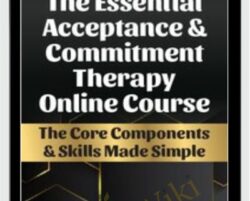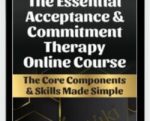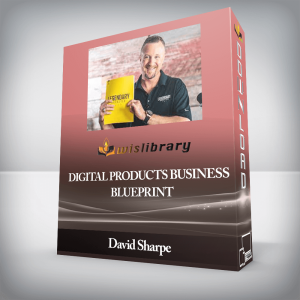The transdiagnostic, “third wave,” Acceptance & Commitment Therapy (ACT) approach is exploding in popularity — because it gets results.This popular and empirically validated approach weaves mindfulness and cognitive behavioral strategies together to revolutionize client outcomes — making it an ideal solution for working with challenging clients struggling with anxiety, PTSD, depression, personality disorders and more.And now you can learn how to apply this powerful approach with this comprehensive, self-paced online course.Register today and you’ll join two of today’s leading ACT instructors Michael C. May, MA, LCPC, and Daniel Moran, Ph.D., BCBA-D, as they guide you through easy-to-follow ACT exercises and interventions that you can start using with your very next client.Don’t wait… Thousands of practitioners have already discovered the power of ACT.Register for this new self-paced online course and get the skills you need to revolutionize your clinical outcomes.Get The Essential Acceptance & Commitment Therapy Online Course – Michael C. May & Daniel J. Moran, Only Price $49Change your clinical work and change your lifeBy mastering Acceptance & Commitment Therapy, you will help your clients create lives full of meaning — based on their values. And with this intensive online training, you’ll discover exactly how to…Integrate easy-to-use ACT exercises & interventions into your practice — immediately.Improve treatment outcomes for difficult-to-treat clients struggling with anxiety, depression, PTSD, personality disorders, substance use, and more.Increase client willingness and engagement using ACT principles as you guide your clients towards making meaningful behavioral changes.Radically transform your ability to conduct clinical assessments with the Inflexahex diagnostic model.Reduce burnout; walk into sessions feeling grounded, secure, knowledgeable, and ready to engage with new ACT exercises and interventions.Increase confidence in your clinical work AND free up time in your day by reducing the amount of time you spend preparing for sessions.Become the clinician who is able to take on difficult clients as you get lifetime access to a new theoretical approach, an entirely new arsenal of tools that will enhance your work, and so much more!Part 1: Master the Core Components & Skills of ACT with Michael C. May, MA, LCPCMichael C. May, MA, LCPC, will give you step by step instruction through applying the six core processes of Acceptance and Commitment Therapy in sessions with clients.Whether you are new to ACT or experienced, Michael has new, in-depth insights that will expand your repertoire of ACT interventions and concepts.OutlineACT Foundations: What You Need to Know Context: Why it is Fundamental to ACTHow to determine the functional purpose of behaviorWhat is language: Relational Frame TheoryThe source of psychological sufferingThe ACT model of psychopathologyExperiential avoidance, cognitive fusion & the toxic cyclePsychological Flexibility: What it is & why it’s importantThe Inflexahex diagnostic modelLimitations of the research & potential risksAcceptance: Combat Experiential Avoidance What is “acceptance” in ACT?Experiential avoidance: The “Control Agenda”Client control over unwanted thoughts & feelingsHow to confront the control agendaInterventions for fostering acceptanceAcceptance Exercises: The “Unwanted Party Guest;” “Barriers to Writing”Defusion: Break Down Thoughts as Barriers The problem with cognitive fusionWeaken unworkable language functionsShould thoughts always control behavior?Build an environment of defusion within sessionStrategies for building defusion skillsDefusion Exercise: “Having vs Believing” our thoughtsSelf-As-Context: Aid Clients in Distancing Themselves from Their Thoughts What is self-as-context?Self-as-content vs. self-as-contextMitigate attachment to the conceptualized selfHelp clients understand self-as-contextInterventions to foster self-as-contextSelf-As-Context Exercise: The “observer self”Contact with the Present Moment: Mindfulness Strategies to Reduce Worry about the Past & Future Mindfulness: A core feature of all human psychopathologyWhat “mindfulness” means in ACTThe goal of mindfulness practice in ACTHow to train mindfulness with flexibilityOvercome obstacles in teaching mindfulnessAddress relaxation-induced panicFormal & informal mindfulness interventionsContact with the Present Moment Exercise: Mindfulness without MeditationValues: Guide Clients in Identifying & Clarifying What Matters The importance of values in ACTHow values can be transformative in human behaviorValues & goalsHow to evoke values from clientsFrom instant gratification to pursuit of valuesValues Clarification Exercise: The EulogyCommitted Action: Establish Values-Consistent Patterns of Behavior The relationship between values & committed actionWhat’s considered committed action?Address persistent inaction, impulsivity or avoidanceInterventionsExposure-based approachesBehavioral activation strategiesSocial-skills training interventionsProblem-solving barriers to committed actionBehavioral homeworkCase Study: Engaging in committed action with depressionGet The Essential Acceptance & Commitment Therapy Online Course – Michael C. May & Daniel J. Moran, Only Price $49Part 2: ACT for PTSD, Anxiety, Depression & Personality Disorders with Daniel J. Moran, PhD, BCBA-DIn Part 2, Daniel J. Moran, PhD, BCBA-D, will expand your ACT foundations to show you how to easily weave mindfulness with cognitive-behavioral change strategies to enhance ACT techniques with clients who are struggling with PTSD, anxiety, depression and personality disorders.OutlineThe ACT ModelPain vs. sufferingLanguage as a double-edged swordGoal: Psychological flexibilityLimitations of the research & potential risksHow to Foster Client Acceptance of EmotionsHow to sidestep the happiness trapSpot common phrases of non-acceptanceHow to help clients understand acceptanceExperiential Exercise: The finger trapHow to Change the Way Clients Interact with Their ThoughtsGive clients skills to notice their thoughtsHow to decrease believability of unhelpful thoughtsExperiential Exercise: Notice the meaning of languageHow to Help Aid Clients in Establishing Their IdentitiesHow to describe the “observer self” to clientsHow to distance the self from thoughts & emotionsUsing the chess board metaphorExperiential Exercise: ”I am” exerciseThe Strategies You Need to Build Attention to the Here & NowHow language affects mindfulnessThoughtFit exercisesObstacles in teaching mindfulnessExperiential Exercise: Mindfulness meditationHow to Help Clients Determine What Gives Life MeaningHow to help clients author their valuesValues vs. goalsWhat to do when clients are “stuck”Batteries exerciseEpitaph exerciseHow to Assist Clients in Behaving in the Service of Chosen ValuesAddress rule-governed behaviorExposure & ritual prevention strategiesThe Mindful Action PlanACT in ActionPTSDFunction of trauma symptomsExperiential avoidance in PTSDIncrease psychological safetyDominating concepts of the past & futureTrauma-informed mindfulness exercisesAnxiety Client avoidance & escape strategiesAssessment toolsAddress reason-giving as a barrierStrategies to increase willingnessAnxiety Detector exerciseDepression Values contradictionHow experiential avoidance impacts depressionFusion to the damaged conceptualized selfBehavioral activation strategiesPersonality Disorders Coping strategiesIncrease emotional toleranceTarget the client’s storyExperiential avoidance from the therapistGet The Essential Acceptance & Commitment Therapy Online Course – Michael C. May & Daniel J. Moran, Only Price $49Tag: The Essential Acceptance & Commitment Therapy Online Course – Michael C. May & Daniel J. Moran Review. The Essential Acceptance & Commitment Therapy Online Course – Michael C. May & Daniel J. Moran download. The Essential Acceptance & Commitment Therapy Online Course – Michael C. May & Daniel J. Moran discount.
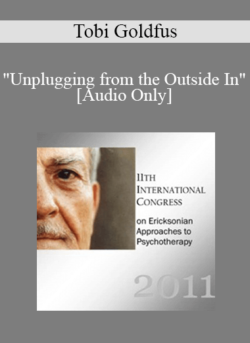 [Audio] IC11 Short Course 24 – “Unplugging from the Outside In”: Brief Strategic Hypnotherapy with Older Adolescents and Young Adults (Ages 16-25) – Tobi Goldfus
₹830.00
[Audio] IC11 Short Course 24 – “Unplugging from the Outside In”: Brief Strategic Hypnotherapy with Older Adolescents and Young Adults (Ages 16-25) – Tobi Goldfus
₹830.00
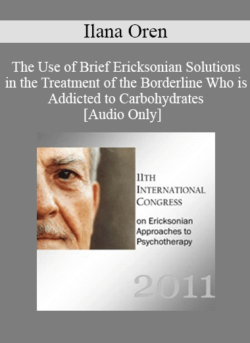 [Audio] IC11 Short Course 23 – The Use of Brief Ericksonian Solutions in the Treatment of the Borderline Who is Addicted to Carbohydrates – Ilana Oren
₹830.00
[Audio] IC11 Short Course 23 – The Use of Brief Ericksonian Solutions in the Treatment of the Borderline Who is Addicted to Carbohydrates – Ilana Oren
₹830.00
The Essential Acceptance & Commitment Therapy Online Course – Michael C. May & Daniel J. Moran
₹7,304.00

